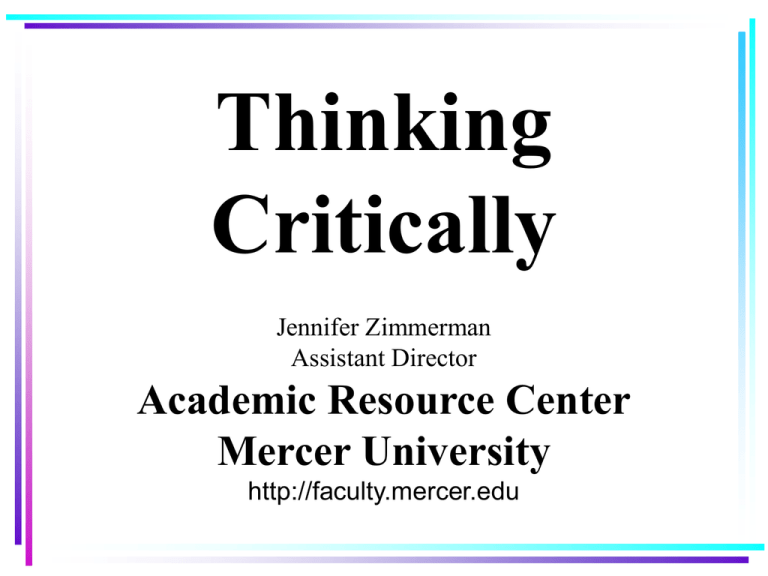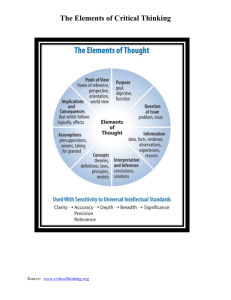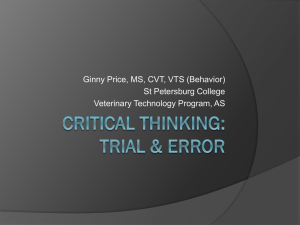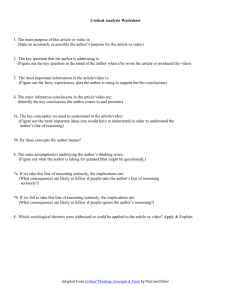PowerPoint Presentation on Critical Thinking
advertisement

Thinking Critically Jennifer Zimmerman Assistant Director Academic Resource Center Mercer University http://faculty.mercer.edu The Academic’s Quest How do we move beyond what we already know? How do we expand the domain of knowledge? How will we know when a “discovery” or conclusion constitutes new knowledge? What is the mark of truth? Lacking a signpost for truth, those in the knowledge business strive to find methods of thinking and knowing that ultimately will grow the store of known truths. is acknowledged as the single-most reliable platform for expanding knowledge across each and every academic discipline. A Critical Thinking Process Flow Observations. From a series of observations, we establish: Facts. From a series of facts, or from an absence of fact, we make: Inferences. Testing the validity of our inferences, we make: Assumptions. From our assumptions, we form our: Opinions. Taking our opinions, we use the principles of logic to develop: Arguments. And when we want to challenge the arguments of others, we employ: Critical Analysis through which we challenge the observations, facts, inferences, and so on, in the arguments that we are analyzing (9) http://www.dartmouth.edu/%7Ecompose/faculty/pedagogies/thinking.html#elements Critical Thinking Checklist These critical thinking skills include separating relevant from irrelevant information, distinguishing between verifiable facts and value claims, determining the credibility of a source, recognizing inconsistencies in a line of reasoning, and determining the strength of an argument or a claim. (1) The Critical Thinking Tradition From Dewey's perspective, which underlies almost all views of thinking in the social studies, a reflective thinker is someone who is aware of a problem and able to bring critical judgment to that problem. He or she understands that there is uncertainty about how a problem may best be solved, yet is able to offer a judgment about the problem that brings some closure to it. That type of judgment, which Dewey referred to as grounded or warranted assumption, is based on criteria such as evaluation of evidence, consideration of expert opinion, and adequacy of argument. (10) How do you learn to practice a new method of thinking? Acquire Skills Develop Dispositions or Traits Evaluate your thinking practices according to Standards Skills Categorization Decoding significance Clarifying meaning Interpretation Examining ideas Identifying arguments Analyzing arguments Analysis Assessing claims Assessing arguments Evaluation Querying evidence Conjecturing alternatives Drawing conclusions Inference Stating results Justifying procedures Presenting arguments Explanation Self-examination Self-correction Self-regulation (2) p7. http://www.insightassessment.com/pdf_files/DEXadobe.PDF Dispositions Truthseeking: A courageous desire for the best knowledge, even if such knowledge fails to support or undermine one’s preconceptions, beliefs or self-interests. Open-mindedness: Tolerance for divergent views, self-monitoring for possible bias. Analyticity: Demanding the application of reason and evidence, alert to problematic situations, inclined to anticipate consequences. Systematicity: Valuing organization, focus and diligence to approach problems of all levels of complexity. CT Self-confidence: Trusting of one’s own reasoning skills and seeing oneself as a good thinker. Inquisitiveness: Curious and eager to acquire knowledge and learn explanations even when the applications of the knowledge are not immediately present. Maturity: Prudence in making, suspending or revising judgment. An awareness that multiple solutions can be acceptable. An appreciation of the need to reach closure even in the absences of complete knowledge. (1) p15 – paraphrase of an excerpt from The Delphi Report Empathy Humility Courage Integrity Perseverance Curiosity Civility Responsibility (3) http://criticalthinking.org/University/intraits.html Standards Clear Deep Accurate Broad Precise Logical Relevant Significant (6) http://criticalthinking.org/University/unistan.html (4) http://criticalthinking.org/University/questioningmind.htm Edman’s Classroom Rules for Critical Thinkers 1. Because you are not God, it is inevitable some of the beliefs and viewpoints you firmly hold are completely wrong. 2. You must understand the viewpoints of those who disagree with you before you are fully able to understand your own viewpoints. 3. Until you can summarize another viewpoint so well those who hold it agree with your summary, you do not understand that viewpoint. (2) Edman’s Classroom Rules for Critical Thinkers 4. You should always assume those who disagree with your viewpoint are as intelligent and as noble-minded as you are. 5. You must be willing to seriously consider alternative viewpoints and to change your mind in order to be a critical thinker. 6. A retreat into relativism is a retreat away from critical thinking. Not all viewpoints are equally valid. (2) The Elements of Critical Thinking 1. All reasoning has a purpose. 2. All reasoning is an attempt to figure something out, to 3. 4. 5. 6. 7. 8. settle some question, to solve some problem. All reasoning is based on assumptions. All reasoning is done from some point of view. All reasoning is based on data, information, and evidence. All reasoning is expressed through, and shaped by, concepts and ideas. All reasoning contains inferences by which we draw conclusions and give meaning to data. All reasoning leads somewhere, has implications and consequences. (5) http://criticalthinking.org/University/helps.html 1. All reasoning has a purpose. Take time to state your purpose clearly. Distinguish your purpose from related purposes. Check periodically to be sure you are still on target. Choose significant and realistic purposes. (5) http://criticalthinking.org/University/helps.html 2. All reasoning is an attempt to figure something out, to settle some question, to solve some problem. Take time to clearly and precisely state the question at issue. Express the question in several ways to clarify its meaning and scope. Break the question into sub questions. Identify if the question has one right answer, is a matter of opinion, or requires reasoning from more than one point of view. (5) http://criticalthinking.org/University/helps.html 3. All reasoning is based on assumptions. Clearly identify your assumptions and determine whether they are justifiable. Consider how your assumptions are shaping your point of view. (5) http://criticalthinking.org/University/helps.html 4. All reasoning is done from some point of view. Identify your point of view. Seek other points of view and identify their strengths as well as weaknesses. Strive to be fair-minded in evaluating all points of view. (5) http://criticalthinking.org/University/helps.html 5. All reasoning is based on data, information and evidence. Restrict your claims to those supported by the data you have. Search for information that opposes your position as well as information that supports it. Make sure that all information used is clear, accurate, and relevant to the question at issue. Make sure you have gathered sufficient information. (5) http://criticalthinking.org/University/helps.html 6. All reasoning is expressed through, and shaped by, concepts and ideas. Identify key concepts and explain them clearly. Consider alternative concepts or alternative definitions to concepts. Make sure you are using concepts with care and precision. (5) http://criticalthinking.org/University/helps.html 7. All reasoning contains inferences or interpretations by which we draw conclusions and give meaning to data. Infer only what the evidence implies. Check inferences for their consistency with each other. Identify assumptions which lead you to your inferences. (5) http://criticalthinking.org/University/helps.html 8. All reasoning leads somewhere or has implications and consequences. Trace the implications and consequences that follow from your reasoning. Search for negative as well as positive implications. Consider all possible consequences. (5) http://criticalthinking.org/University/helps.html (1) Dawson, Roy E. Critical Thinking, Scientific Thinking, and Everyday Thinking: Metacognition about Cognition. Academic Exchange Quarterly Fall 2000: v4 i3 p76. Infotrac Online Library. 28 May 2002 <http://www.infotrac-college.com>. (2) Edman, Laird R. O. Teaching Critical Thinking: Pedagogy and Assessment. Center for Teaching and Learning Calendar of Past Events. 28 February 2002. Mercer University. 28 May 2002 <http://www.mercer.edu/ctl/edman.htm.>. (3) Edman, Laird R. O. Teaching Thinking: The state of the art [handout]. Mercer University. 28 February 2002. (4) Elder, Linda and Richard Paul, University Library: The Critical Mind is a Questioning Mind. Critical Thinking Consortium. Foundation for Critical Thinking. 28 May 2002 <http://criticalthinking.org/University/questioningmind.htm>. (5) Elder, Linda and Richard Paul, University Library: The Elements of Critical Thinking: Helping Students Assess Their Thinking. Critical Thinking Consortium. Foundation for Critical Thinking. 28 May 2002 <http://criticalthinking.org/University/helps.html>. (6) Elder, Linda and Richard Paul, R. University Library: Universal Intellectual Standards. Critical Thinking Consortium. Foundation for Critical Thinking. 28 May 2002 <http://criticalthinking.org/University/unistan.html>. (7) Elder, Linda and Richard Paul, R. University Library: Valuable Intellectual Traits. Critical Thinking Consortium. Foundation for Critical Thinking. 28 May 2002 <http://criticalthinking.org/University/intraits.html>. (8) Facione, Peter A. Executive Summary: Critical Thinking: A Statement of Expert Consensus for Purposes of Educational Assessment and Instruction. American Philosophical Association Dephi Research Report. 1990. The California Academic Press. 28 May 2002 <http://www.insightassessment.com/pdf_files/DEXadobe.PDF>. (9) Goscik, Karen. Teaching Critical Thinking: Elements of Critical Thinking. Composition Center. 1997. Dartmouth College. 28 May 2002 <http://www.dartmouth.edu/%7Ecompose/faculty/pedagogies/thinking.html>. (10) Hine, Allison and Lyn Peacock. Thinking Skills to Creatively Enhance Information Competence. Academic Exchange Quarterly Fall 2000: v4 i3 p92. Infotrac Online Library. 28 May 2002 < http://www.infotrac-college.com>.





